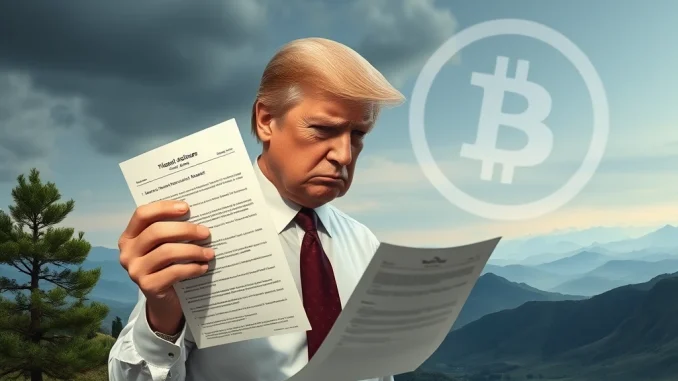
News has emerged highlighting a significant lapse in financial reporting by a prominent figure in US politics. **Texas Representative** Brandon Gill is currently facing scrutiny following a late **Bitcoin disclosure**, drawing attention to the requirements and enforcement of laws designed to ensure transparency among elected officials.
What Happened with the Late **Bitcoin Disclosure**?
According to reports, including one from Decrypt, **Texas Representative** Brandon Gill failed to report substantial purchases of Bitcoin within the legally mandated timeframe. The specific amount involved is estimated to be up to $500,000 worth of Bitcoin, acquired through his brokerage account. The key issue isn’t the purchase itself, but the delay in reporting it.
Members of Congress are required by law to disclose their financial transactions, including cryptocurrency investments, within 45 days of the trade. This requirement is a cornerstone of the **STOCK Act**, intended to prevent insider trading and ensure public trust.
Understanding the **STOCK Act** and Its Requirements
The Stop Trading on Congressional Knowledge (STOCK) Act, passed in 2012, aims to increase transparency regarding the financial holdings and transactions of members of Congress and other government employees. Its core provisions require timely public disclosure of stock, bond, and commodity futures transactions exceeding $1,000. In recent years, this has been interpreted to include cryptocurrency holdings and transactions.
Key aspects of the **STOCK Act** include:
- **Disclosure Deadline:** Transactions must typically be reported within 45 days.
- **Purpose:** To deter insider trading by making congressional financial activity public.
- **Penalty for Violations:** The standard penalty for late disclosure is a $200 fine.
However, the effectiveness of the Act’s enforcement has often been questioned. The $200 fine is relatively small, especially compared to the potential value of undisclosed assets or the profits from timely trades. Furthermore, these fines are frequently waived, reducing the deterrent effect.
Why **Congressional Crypto Disclosure** Matters
The case involving **Brandon Gill** underscores the importance of stringent **congressional crypto disclosure**. As digital assets like Bitcoin become more integrated into the global economy, lawmakers’ financial interests in this space become increasingly relevant. Public disclosure helps identify potential conflicts of interest, particularly for representatives who sit on committees that oversee financial regulations, technology, or monetary policy.
For instance, a lawmaker holding significant amounts of Bitcoin might face a conflict when voting on legislation that could impact cryptocurrency markets. Timely and transparent disclosure allows the public and ethics watchdogs to monitor these potential conflicts.
The Scrutiny on **Brandon Gill**
While late financial disclosures are not uncommon in Congress, the focus on **Brandon Gill** highlights the growing attention paid to lawmakers’ cryptocurrency holdings. Given the volatility and evolving regulatory landscape of digital assets, transparency is crucial.
The fact that the disclosure was late, even if the fine is minor or waived, raises questions about adherence to transparency rules. It adds to ongoing debates about whether the penalties for violating the **STOCK Act** are sufficient to ensure compliance and whether the current disclosure framework is adequate for complex digital assets.
Moving Forward: The Need for Stronger Oversight?
This incident, like others before it, prompts a conversation about strengthening the **STOCK Act** and ensuring robust **congressional crypto disclosure**. Potential reforms could include increasing penalties for late disclosures, requiring more detailed information about crypto holdings, or implementing stricter enforcement mechanisms.
Ensuring that elected officials are fully transparent about their financial dealings, including their investments in rapidly evolving sectors like cryptocurrency, is vital for maintaining public trust and the integrity of the legislative process.
Conclusion: Transparency is Key
The late **Bitcoin disclosure** by **Texas Representative** Brandon Gill serves as a timely reminder of the challenges in enforcing financial transparency laws like the **STOCK Act**. While the technical violation may carry only a small penalty, the incident highlights broader concerns about potential conflicts of interest and the need for timely and complete **congressional crypto disclosure**. As digital assets become more mainstream, maintaining public confidence requires lawmakers to lead by example through unwavering transparency in their financial affairs.



